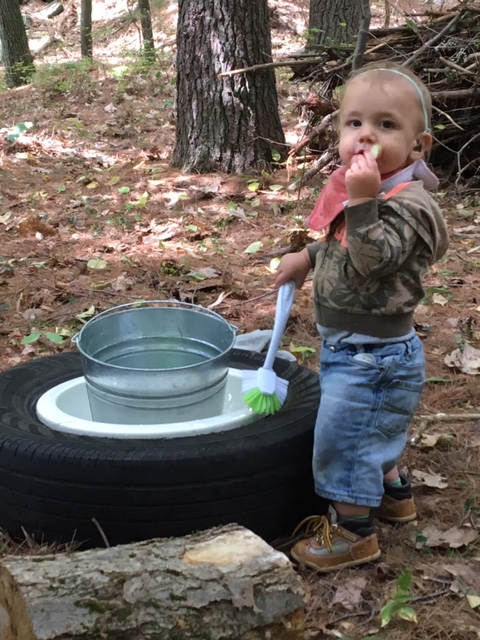
By Elizabeth Wilkins & Angela Hanscom
The woods are unusually crowded with adults. As a TimberNook provider, I am used to being one of only a few adults in the forest. However, today we have our parent/child group out exploring the space. The parents appear just as eager as the children when entering the natural setting.
I watch both the adults and children in action. The children naturally start experimenting with the “staged” environment. One child is carefully pouring birdseed from a dainty teapot into another container. Another is rolling a tire up and down our biggest hill, over and over again. A third child is creating music by pounding his wooden spoon on metal pots and pans, while a child nearby grooves to his music. Without knowing it these little ones are refining their muscles, senses, and ingiting creativity at the same time.
And all the while, the parents and caregivers have their own learning experience. At first, they appear reluctant to provide any space for their children to play. As one child gravitates towards the boulders, the parent quickly follows suit, arms guarding the child as they navigate the uneven terrain towards the large rocks. She constantly repeats the phrase, “be careful” while spotting her child, as if this will help the child be more capable navigating their environment. Another child playing with the kitchen items, turns to see his parent right next to him. The parent takes this as a cue to point out different items on the table. The child subsequently becomes less interested in the kitchen area and moves on to a new one. I take this as my sign to start walking around and speaking to the parents about the incredible value of “stepping back.”
Parents are encouraged to quietly observe the children here. To take a backseat to the action — an unusual request for the 21st century. Today, adults are often expected to be close and responsive to children at all times. We are to praise every new discovery, continuously point things out to our children, and even be physically present to assist whenever needed. It can sometimes be a tall order. Especially if this is required 100 percent of the time!
It is also common for the children of today to look to a parent or other adult before taking on any new challenge; asking with their eyes, “Am I ok? Is this too risky for me? Are you going to stop me?” Some of this checking in is certainly normal and healthy, especially with the very young ones. But what happens when the child learns to solely depend on an adult prior to taking on any new challenges? What message does that give to the child? And where does that leave a parent, when the child begins to hold back from new situations with a sense of uncertainty about their ability to cope? These questions are always addressed in this group. Parents and caregivers are permitted and even encouraged to step back and empower their child to take the lead in their play experiences.
We value the act of reducing the presence of adults during TimberNook time, in order to allow children to solve their own problems and to turn to other children to initiate new play ideas. We should not feel guilty in letting our children have opportunities to direct their play, but to celebrate these moments instead. If we always do everything for them, they will never have the chance to do things for themselves. There must be a balance: time playing with our children and also adequate time to play alone or with other children. Both are valuable. And both deserve attention.
There is no doubt that our world is changing rapidly. However, some things need to remain the priority. Allowing children time and space to play, unhindered by adult fears is a key ingredient to fostering healthy and independent play. This is where TimberNook comes in, to provide a safe place for parents to practice these skills of letting go and observing our children as autonomous beings with their own capacity to think, move, and play. This is a space where children can get dirty, make mistakes, deal with reasonable conflict, reflect, experiment, and grow. This gives them a chance to exercise their inner strength, to become stronger and wiser going forward. What greater gift could a parent give?
I love watching not only the children transform throughout their experience here, but also the adults as well. Each week, I see growth in the adults and a new confidence as they let go of their worries, fears, and preconceived thoughts of what play should look like. By the end, they often stand back in amazement at the things their children are capable of and start to bring this theory into their home life.
It is these thoughts and reflections that will keep me opening these woods to new parents — no matter how much it changes the feel of our TimberNook space at first. The lessons learned here are life-changing for both the child and the adult.
